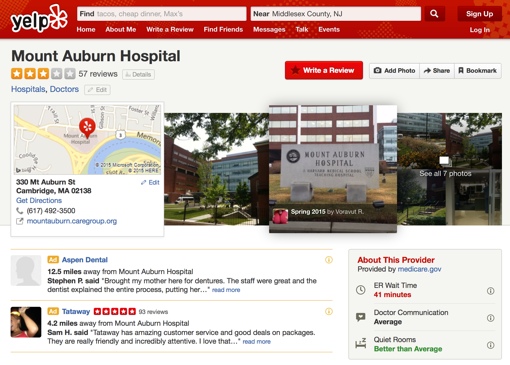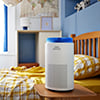 Local ratings site Yelp isn’t just for stores and restaurants – it has listings and reviews for professionals and hospitals in your area. Now, those hospital pages have added data about ER wait times, doctor communication and patient room loudness. Nursing home pages, meanwhile, contain information about fines paid to the federal government and whether inspections have shown “serious deficiencies” within the last 3 years. There’s new data about dialysis clinics too – great information for those with kidney problems.
Local ratings site Yelp isn’t just for stores and restaurants – it has listings and reviews for professionals and hospitals in your area. Now, those hospital pages have added data about ER wait times, doctor communication and patient room loudness. Nursing home pages, meanwhile, contain information about fines paid to the federal government and whether inspections have shown “serious deficiencies” within the last 3 years. There’s new data about dialysis clinics too – great information for those with kidney problems.
The data is being provided to Yelp via the non-profit ProPublica, which in turn is getting much of its data from medicare.gov. Data is color coded (green is good), and you can pull up additional information by hovering your mouse cursor over the information icon. In total, Yelp now has information on 4,600 hospitals, 15,000 nursing homes, and 6,300 dialysis clinics in the U.S., all of which will be updated on a quarterly basis. This is offered in addition to the usual star rating system and user reviews.
According to Yelp, healthcare organizations now make up 6 percent of reviewed businesses. “We’re taking data that might otherwise live in some government PDF that’s hard to find and we’re putting it in a context where it makes sense for people who may be in the middle of making critical decisions,” says Yelp VP for Policy Luther Lowe.
It’s important to remember here that the ER wait times listed in Yelp are averages, and not real-time estimates. Still, the data makes it easy to compare hospitals and other health care facilities in your area – good information to have the next time your family has a minor emergency. (Just be sure you read our primer on how to tell if a Yelp review is fake, first!)
[Image credit: Yelp]














From Dave Landon on August 06, 2015 :: 11:34 am
According to Guru Focus, “Yelp (NYSE:YELP) has established itself as one of the most hated companies in the U.S.”
It won’t be long before ProPublica finds that this is one of the worst moves they have ever made. Yelp reviews are outdated, unverified, and not representative of a healthcare provider’s services. Reviews from a small percentage of patients, positive or negative, actually does a disservice to those looking for indications of service quality.
Yelp has found that their restaurant advertising is declining and they are seeking new markets. Yes, doctors have money. Yelp is pursuing them because with HIPPA they can not defend themselves in court. This is not a public service, but a move initiated by greed from a company that has been clearly not a profitable venture for the last 10 years.
Yelp creates a listings for a provider without their permission, they then use their search engine power to have that listing seen before the provider’s own listing. On that listing they place ads for competitors. So if you look for Dr. Jones, there will be listings for other doctors that page. When Dr. Jones complaints, Yelp tells the doctor, pay us $10,000 a year and your competitors will not appear on your page, it is a service we provide! Many have said this feels like extortion.
Yelp does not have a customer service number, it responds to service requests with canned, pre-written replies and if you go to Yelp’s own page, you will find it rates 2.5 stars and has the highest number of 1-star reviews of any company in the world. So if you believe in the quality of Yelp reviews, begin with the reviews of Yelp itself. You might also ask why 7,248 reviews of Yelp are hidden so they do not contribute to it’s low rating. http://www.yelp.com/biz/yelp-san-francisco
Reply